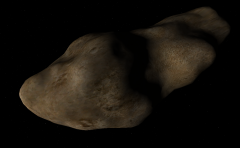Difference between revisions of "1620 Geographos"
(Added gallery.) |
(Added content.) |
||
| Line 63: | Line 63: | ||
Geographos was to be visited by the [[w:Clementine mission]], failed to reach the body. | Geographos was to be visited by the [[w:Clementine mission]], failed to reach the body. | ||
| + | |||
| + | == Geographos in Orbiter == | ||
| + | 1620 Geographos was modeled in Orbiter as a soomewhat potato shaped object about 5 km on the longest dimension. Landing anywhere on the body's radius you end up well above the visual surface. Because even at the surface, geographos only provides 1% of the local gravity, the [[Sun]] providing the other 99%, a ship cannot orbit geographos, it can only fly along with it in solar orbit, maneuvering in its vicinity. A ship also cannot land and remain on the hard surface, it will immediately drift off the surface. | ||
== Gallery == | == Gallery == | ||
Revision as of 03:21, 27 May 2024
|
Project home: Asteroid Pack 1.00 |
1620 Geographos is a Near-Earth object discovered in 1951 by Albert George Wilson and w:Rudolph Minkowski at Palomar and is named in honor of the w:National Geographic Society.
Geographos was to be visited by the w:Clementine mission, failed to reach the body.
Geographos in Orbiter
1620 Geographos was modeled in Orbiter as a soomewhat potato shaped object about 5 km on the longest dimension. Landing anywhere on the body's radius you end up well above the visual surface. Because even at the surface, geographos only provides 1% of the local gravity, the Sun providing the other 99%, a ship cannot orbit geographos, it can only fly along with it in solar orbit, maneuvering in its vicinity. A ship also cannot land and remain on the hard surface, it will immediately drift off the surface.
Gallery
| edit The Solar System | |
|---|---|
| Central star |
Sun (Sol) |
| Planets |
Mercury - Venus - Earth - Mars - Jupiter - Saturn - Uranus - Neptune |
| Natural satellites |
Moon - Phobos - Deimos - Io - Europa - Ganymede - Titan - more... |
| Add-ons |
Planets - Dwarf Planets - Small objects - Natural satellites - Alternative star systems |

